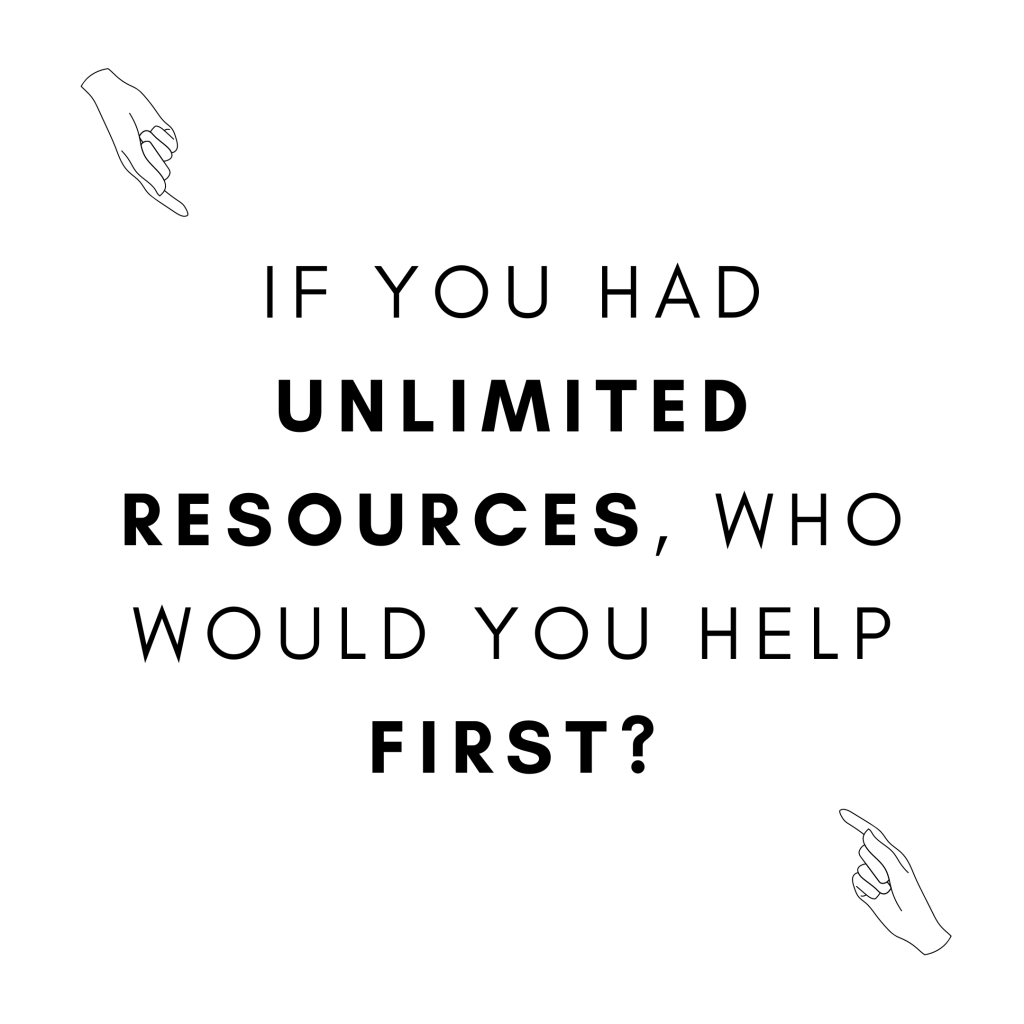Hello! Happy Monday, and welcome to my first Monday Digest. This is a weekly series of challenging thoughts, must-read articles and the opportunity to influence what I write about in a given week. Welcome!
If you had unlimited resources, who would you help first?
I know, I know, this question is super heavy and abstract. It’s difficult to answer, but I think that our responses (or reactions) to this hypothetical question can help us to decipher how to use the resources that we do have– no matter how limited.
In a way, our time is our most valuable (and our most nearly ‘unlimited’) resource. Lately, I’ve been thinking a lot about how to best use my career, or more specifically, the resource of time, to help others. Which issues are most pressing? Where can I make the greatest impact given my skills, abilities, and education? Where am I needed the most? Conversely, where would my work not have impact?
Should I start my career by helping those who most need it? Or should I develop the skills and experience to have the greatest impact long term?
I have lots more questions, and the beginnings of answers, and I hope you’ll think about this question and how you would answer it for yourself. I don’t think that there’s necessarily a correct answer– it seems that who one would help first depends on their context and abilities. I think that the value of this question is that it centers on making an immediate impact (who you would help first) while maintaining an assumption and vision of future impact (with unlimited resources). So while purely hypothetical, this question can challenge us to lean into this tension between current and future needs and impact.
Must read
We’re all exhausted from hearing and reading about COVID-19. But if you have the time for one more article about the global pandemic, it should be “Dear Vanderbilt, commit to a free vaccine.” This piece, a guest editorial written by my friend Klara in the Vanderbilt Hustler*, explains why an accessible vaccine is necessary for health equity. Klara makes a really compelling argument, and whether or not you’re a student or affiliated with Vanderbilt, this is an important read to be informed about accessibility to a COVID-19 vaccine. I also love that she includes action steps at the end of her article.
What should I write about this week?
This week, I’m giving our readers the option to choose what I write about!
On Thursday, I will publish a post about either multidimensional poverty or violence as a public health issue. I recently learned of multidimensional poverty– a definition of poverty that goes beyond economic deprivation to include factors like health, education, and the threat of violence. I am also considering writing about violence as a public health issue– how public health tools are used to study and prevent violence at the individual, community and societal levels.
In any given week, there are quite literally dozens of topics that I’d like to write about. However, as I’ve previously noted, my time is not unlimited. I’d like to spend that time learning and writing about topics that you, our readers, also want to learn about.
Which topic should I write about? Vote below!
[wpforms id=”1875″ title=”false” description=”false”]What I’m looking forward to
We’ve got a lot of great content this week in The Journal. Tomorrow, Heream’s article on privilege in philanthropy will be live. You’re going to love her perspective and thoughtfulness on this topic. I’m also looking forward to the final part of Yuna’s series on how COVID-19 has exacerbated inequities for Indigenous people, and the final part of Kelly’s series on the school-to-prison pipeline.
Have a great week!

*Disclosure: Alexa wrote for the Vanderbilt Hustler while she was a student at Vanderbilt University.
- College Football, Ariana Grande, and Water - September 3, 2023
- Livestock and Land Use: How Are We Feeding The Planet? Impactfull April 2022 - April 19, 2022
- What Does Voluntourism Look Like? A Case Study in a Cambodian Orphanage - March 28, 2022
